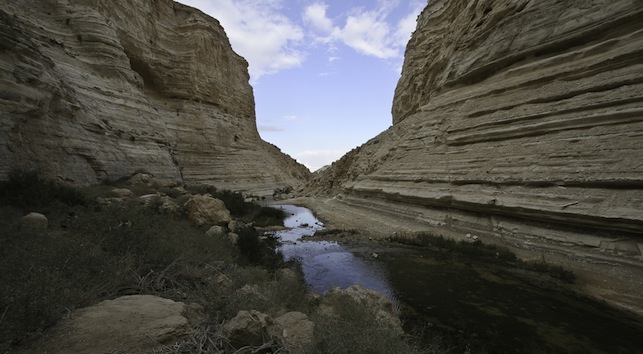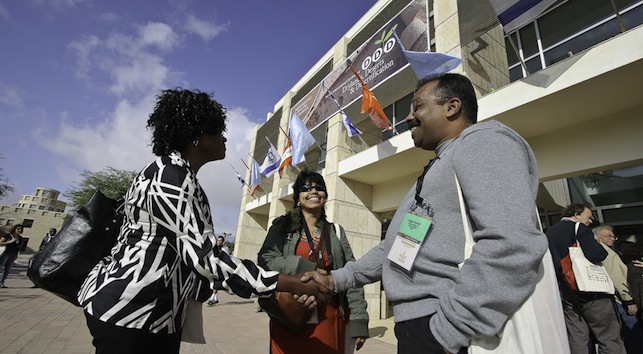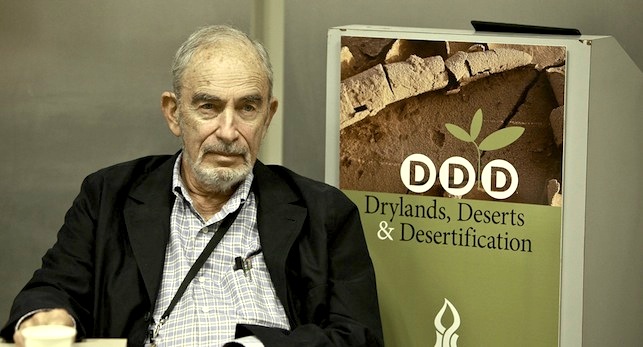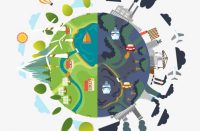They will live in the barren drylands, in an uninhabited salty land… Like a tree planted by water… its leaves remain green, and… it does not cease to bear fruit.” – Jeremiah, 17:6-8
They will live in the barren drylands, in an uninhabited salty land… Like a tree planted by water… its leaves remain green, and… it does not cease to bear fruit.” – Jeremiah, 17:6-8
It’s Monday, November 12th, 2012, and I’m at the opening plenary of the fourth International Conference on Drylands, Deserts and Desertification. The conference is hosted by the Blaustein Institute for Desert Research on the Sede Boqer Campus of Ben-Gurion University in Beersheba, Israel. The conference is sponsored by UNESCO, and is part of the mission of the multilateral UN Convention to combat desertification.
Deserts play a very important role in the history of humanity. Deserts and drylands cover more than 40 per cent of global land area, span more than 100 countries and provide a home to more than 1.3 billion people. Deserts and drylands are becoming increasingly vulnerable to and impacted by climate change, leading to further desertification and intensifying societal and ecological challengs.
The keynote speaker at the conference is Paul Ehrlich, a professor of population studies at Stanford University and president of Stanford’s Center for Conservation Biology. Ehrlich is perhaps best known for his publication of The Population Bomb in 1968, a controversial piece of environmental literature that put forward the thesis that human overpopulation is a direct threat to the survival of the environment and the planet. The fallout from The Population Bomb led to a famous bet in 1980 between Ehrlich and economist Julian Simon over whether or not the real price of minerals would increase within a decade. Simon bet they would drop, and he won the bet quite easily, at the time dealing a blow to the reputation of environmentalists.
However, recent history has been on Ehrlich’s side. In 2011, the Economist admitted that if the bet had ended in 2011, Ehrlich would have won. I’m not certain Ehrlich is actually happy that history has validated his thesis, given the long-term implications of his argument.
As Ehrlich takes to the stage, you can tell he is in his element. He is a fantastic speaker and has the audience laughing throughout, despite the rather grim message he is delivering. Ehrlich asks, rhetorically: “Do you tell them the truth and discourage them? Or do you take some small success stories and make them sound important?” With the audience at the conference, Ehrlich prefers to tell people the truth and make it a challenge for the next generation to take up. Ultimately, he admits that his influence is limited: “I’m going to drink myself to death before this stuff hits.”
Ehrlich is never worried about offending his audience. He was asked to give a provocative speech, and boy did he deliver. One of my media colleagues from the National Post was fuming after the talk, which I guess is no big surprise. But what was it specifically that angered her so much?
First, Ehrlich spoke of the challenges facing the world today, and I’ll try to summarize the major and deeply interrelated points. According to Ehrlich it is clear we’re running down our natural capital, as opposed to living off the income. He gives the example of rapidly diminishing biodiversity and the decline in soil fertility. Climate change of course figures in quite heavily. With the impacts of Hurricane Sandy still keenly felt in the US, Ehrlich argues climate change is finally starting to get some attention, particularly with regards to sea level rise, changing precipitation patterns and the increase in extreme weather events.

Given Ehrlich’s arguments about population, he claims many of our natural problems are rooted in the simple mathematics of overpopulation and its relationship to resource consumption. Predictions consistently say there will be another 2.5 billion people by the year 2050. No one thinks we can adequately feed this many people because agriculture will need to expand into increasingly marginal lands, and meanwhile urban expansion is paving over the best farmland.
Beyond agricultural extraction, there are concerns about resources more generally. Ehrlich and many ecological economists invoke the term Energy Return on Investment (EROI), which is a measure of how much energy we must expend to obtain the energy we wish to consume. As EROI diminishes, more and more energy and resources are spent simply obtaining energy, thereby reducing the surplus available to society. As EROI decreases, societies are increasingly forced to search for resources in ever-more hostile areas, getting ever-decreasing returns for their work. For example, oil wells in Pennsylvania were once about 65 feet deep, whereas Deepwater Horizon had to drill two miles down in the Gulf of Mexico.
Given the focus of the conference on drylands and deserts, Paul spends a bit of time discussing agriculture, which Ehrlich is responsible for between 20 and 34 per cent of GHG fluxes. It is clear that humanity’s most important activity is contributing heavily to its own destruction. Ehrlich argues that we need a lot more research on land degradation and desertification, because we have lots of numbers but we don’t really know what they mean. This is probably true of many facets of the environmental challenge.
The second surprising and potentially angering aspect of Ehrlich’s speech, especially given the venue, was his critique of Israel. According to Ehrlich, Israel is very rich and overconsuming, and despite having some of the best scientists in the world, it manages its land like a third world country. Ehrlich chides Israel for having too large a population for its landmass, and recommends that the birthrate drop from three down to 1.5, and then continues to decline to bring Israel back into check with its natural environment. Israel will not be immune to the effects of climate change. Notably, Israel will likely to have less water and more extreme climate, both of which will worsen an already worrisome transboundary conflict over resources with its neighbours.
But Ehrlich’s purpose is not to single out Israel. Rather, he argues Israel has the potential to do better. It is an ideal place to develop solar power, and has great knowledge of reversing land degradation, knowledge that will be of paramount importance in coming years. Likewise, the intellectual capacity of Israel puts it in a strategic position to be at the frontline of solving the world’s problems.
But how do we solve those problems?

The challenge is turning knowledge into change. Ehrlich notes that we know about the direction the world is going in, and we have the technical knowledge to change things, but lack the ability to promote more constructive human behaviour. This is the million dollar connundrum that vexes people across the world. In tandem with his own research at Stanford, Ehrlich founded the Millennium Alliance for Humanity and the Biosphere to help promote research and give the next generation a chance to make change. He encouraged everyone at the conference to “join the MAHB.”
I had the opportunity to talk to Ehrlich after the opening ceremonies. He is warm and welcoming. He offered encouragement to the students surrounding him. But Ehrlich is definitely no Pollyanna. His guess is the world has a 10 per cent chance of surviving, but it’s worth the effort. As he noted at the end of his speech, “either we can change our ways, or they will be changed for us.”
Stay tuned to read about how this conference can help us all take those proactive steps.












